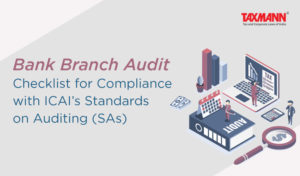Bank Branch Audit Checklist for Compliance with ICAI’s Standards on Auditing (SAs)
- Blog|News|Account & Audit|
- 2 Min Read
- By Taxmann
- |
- Last Updated on 3 March, 2023

It is crucial to ensure quality in bank branch audits through the effective implementation of Standards on Auditing (SAs), just like any other audit engagement. Although the extent of application of SAs may differ significantly based on the size of the branch, it is imperative for the auditor to maintain documentation to demonstrate that the audit was conducted in accordance with the relevant SAs.
To ensure compliance and completeness, it is advisable to maintain checklists for Standards on Auditing (SAs) in the audit documentation file. These checklists can serve as a reference for each audit/assignment conducted. The scope and objective of each SA can be used as a guide while creating the checklists. The following checklist covers the SA 200 to SA 299 – General principles & Responsibilities and SA 300 to SA 499 – Risk assessment & Response to the assessed risks.
I. SA 200 – Overall Objectives of the Independent Auditor and the conduct of an Audit in accordance with Standards on Auditing (SAs)
Scope and Objective: SA 200 lays out the responsibilities of independent auditors when conducting audits of financial statements according to SAs. It defines the objectives of auditors, explains the nature and scope of the audit required to achieve these objectives, and outlines the scope, authority, and structure of the SAs. Additionally, it establishes the general responsibilities of auditors that apply to all audits, including the requirement to comply with SAs.
In conducting an audit of financial statements, the overall objectives of the auditor are:
- To obtain reasonable assurance about whether the financial statements as a whole are free from material misstatement, whether due to fraud or error, thereby enabling the auditor to express an opinion on whether the financial statements are prepared, in all material respects, in accordance with an applicable financial reporting framework
- To report on the financial statements, and communicate as required by the SAs, in accordance with the auditor’s findings.
II. SA 210 – Agreeing the Terms of Audit Engagements
Scope and Objective: SA 210 outlines the duties of auditors in agreeing to the terms of an audit engagement with management and, if necessary, those responsible for governance. This involves confirming that certain conditions for an audit, which are the responsibility of management and governance, have been met.
The objective of the auditor is to accept or continue an audit engagement only when the basis upon which it is to be performed has been agreed, through:
- Establishing whether the preconditions for an audit are present
- Confirm that there is a common understanding between the auditor and management and, where appropriate, those charged with governance of the terms of the audit engagement.
Click Here To Read The Full Story
Disclaimer: The content/information published on the website is only for general information of the user and shall not be construed as legal advice. While the Taxmann has exercised reasonable efforts to ensure the veracity of information/content published, Taxmann shall be under no liability in any manner whatsoever for incorrect information, if any.

Taxmann Publications has a dedicated in-house Research & Editorial Team. This team consists of a team of Chartered Accountants, Company Secretaries, and Lawyers. This team works under the guidance and supervision of editor-in-chief Mr Rakesh Bhargava.
The Research and Editorial Team is responsible for developing reliable and accurate content for the readers. The team follows the six-sigma approach to achieve the benchmark of zero error in its publications and research platforms. The team ensures that the following publication guidelines are thoroughly followed while developing the content:
- The statutory material is obtained only from the authorized and reliable sources
- All the latest developments in the judicial and legislative fields are covered
- Prepare the analytical write-ups on current, controversial, and important issues to help the readers to understand the concept and its implications
- Every content published by Taxmann is complete, accurate and lucid
- All evidence-based statements are supported with proper reference to Section, Circular No., Notification No. or citations
- The golden rules of grammar, style and consistency are thoroughly followed
- Font and size that’s easy to read and remain consistent across all imprint and digital publications are applied



 CA | CS | CMA
CA | CS | CMA
